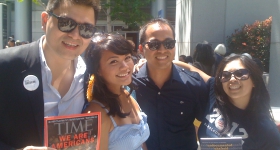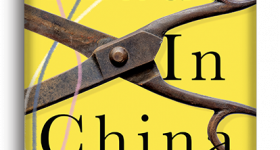While not everyone who uses the term 'chinito/a' is qualifiably a racist per se--they may hold affection for Asians while not thinking through their word choices--certainly 'chinito/a' is used in racist ways, in situations like people stopping their cars, rolling down the windows and yelling at you. Or when you're walking past construction sites. Sometimes it even accompanies the infamous eye-pulling gesture. My personal record is six cars in three hours, and a balled-up rag launched at my head from one of them. In this case, 'ito/ita' is a diminutive, and not necessarily an affectionate one. Especially if the person saying it is a complete stranger.
It is the common mode of addressing all Asians, be they Chinese or not. I'm not Chinese, so naturally it drove me crazy. It's reductive. Can you imagine if, in English, we referred to everyone Latin American person as a Mexican? (Actually, some people do. And it rightly drives Latin Americans crazy.) Every African American as Ethiopian? (Ah, well...) Now adding the diminutive, they would be 'little Mexicans' and 'little Ethiopians.' Ridiculous, right?
I've had discussions where people will reject the term 'asiano/a' because, well, that's just not the way we say it.
By twists and turns, the Spanish terms that are used today to indicate race are full of subtle paradoxes and innuendos. For instance, it was only in the last few decades where the term 'idigeno/a' (indigenous) has gained use, in a movement away from the derogatory, yet 'correct' term, 'indio' (Indian). What made 'indio' so bad? For example, when someone wants to call another person ignorant, that lowest-of-the-low type of ignorant, they might say, 'que indio,' which means 'what an Indian.' The same sort of charge exists for 'negritos' ('little blacks').
One year, while I was waiting in the line at the Panama City airport, my father saw someone in line that he knew, a Panamanian woman. Since I was standing next to my white friend, he thought to point me out as his daughter by explaining, "Es la chinita" ["She's the chinita"]
My jaw dropped. How could he, my own father (though he is white), refer to me by the term that I had broken down crying about for so many years? His adamant defense of the term, and refusal to listen to my position on the matter led to over three years of barely speaking to one another. Extreme? Perhaps. But it was the refusal to listen, more than anything, that led to my retreat. (He finally apologized following heart surgery.)
Language is tricky, and it is powerful. We've all experienced its horribly elastic nature at some point. And, of course, it isn't exclusive to Spanish, or all Spanish-speaking people (for the record). Heck, 'ching chong' isn't part of any language, really, when you think about it.









Comments